Brad Pitt, Leo DiCaprio, Margot Robbie and director Quentin Tarantino talk of ‘Once Upon A Time…in Hollywood’
Los Angeles — What is amazing about Quentin Tarantino’s “Once Upon a Time…in Hollywood" is not only the casting coup of the decade — Brad Pitt, Leonardo DiCaprio and Margot Robbie — but also his visual and cinematic presentation of his homage to Los Angeles set in 1969.
Also noteworthy are the acting of Leonardo as Rick Dalton (an actor who starred in the TV Western series “Bounty Law”), and Brad as Cliff Booth (a Vietnam War veteran and Rick’s loyal stunt double).
The lovely Margot portrays Sharon Tate, the pregnant actress married to director Roman Polanski and next door neighbor of Rick Dalton.
Also in the cast are Al Pacino as Hollywood producer and Rick’s agent Marvin Schwarzs, Bruce Dern as George Spahn, Dakota Fanning as Lynette “Squeaky” Fromme, Emile Hirsch as Hollywood hairstylist Jay Sebring, Margaret Qualley as Pussycat, a member of the “Manson Family”, among others.
We interviewed Brad, Leo, Margot and Quentin and below are excerpts of our conversations with them:
Brad Pitt
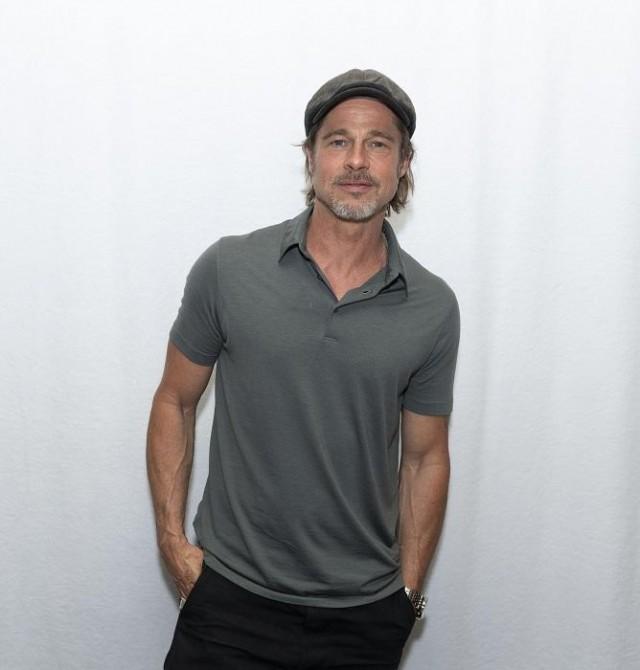
What did you do when you found out that you were going to be on the roof shirtless?
It depends on what character you're doing. But in that movie, I'm playing a stunt man so I have to be on the better end of shape. I try to eat right during the film. Get some exercise. And, that's that.
And then when it's off, then it's Shake Shack and pizzas.
What is your relationship to stuntmen? Have you ever had a camaraderie with one of them? If so, in what movie?
I have great respect for stuntmen. I love stuntmen because they're doing the hard stuff and I'm in my trailer. So, I'm more than happy. I'm more than happy.
It's different these days. Back then, Steve McQueen and Bud Ekins was a historical combination. They were partnerships for an entire career. Bud Ekins comes up with the jump for “The Great Escape,” or the big chase. He and Steve and Bullet. The directors relied on him more. And they relied on each other more. It's different, it's more transitory.
We rely on stunt coordinators who have their own team. It's probably because things are more litigious these days, as well. But these really amazing groups come in and, like we had Zoë Bell on this one and her and her team, they're amazing. But what it represents is the friendships, and that we still have.
I think I got a couple of them sitting in the back right there that I've had for thirty years that fill in the downtimes that make it, not just survivable, but really pleasurable. Those really tight friends that you don't have to say anything with. And that was pretty much the Rick and Cliff camaraderie that Leo and I understand.
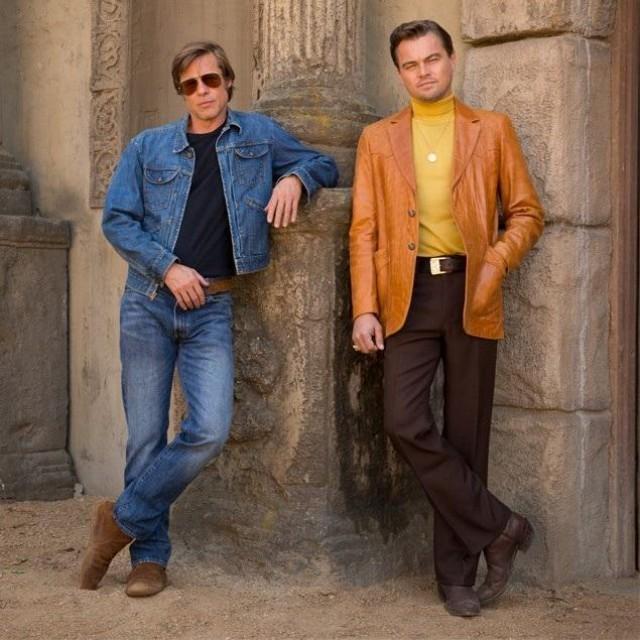
Can you talk about relating to Leo’s character and seeing people who did struggle when they get older and weren’t able to maintain it? How do you sort all that?
What the story's really about is where's your worth? Where do you find your worth? And from Margot, to Leo, to my character or Sharon, to Rick, to Cliff. There is a complete human there. She represents hope and looking at the future. He's dealing with self-doubt and self-worth and he's putting all his worth on what ends up there versus what he's experiencing. And Cliff is more at a place of acceptance and he’s going to make the best of whatever's he's got and knows that he'll figure it out.
So, when I say it's a question of maybe this is just me being older, but to me, it's that seems to be the game. Being human. Finding our worth and where we find it. And too often we get caught up, and especially in our industry, it's very misleading that way. Trying to define our worth by where things land, or what they represent which is a really empty shallow quest. Instead of what's on the inside. Your person relationships, what happens in that day.
Did you experience the casting couch when you were starting?
When I first started out, I certainly met a couple of predatory people. When you're really vulnerable, when you haven't worked, people are most susceptible then, when they're... especially moving out here from the Ozarks and not knowing what's what. Someone says this way, and this is the way. And I certainly, ran into a couple of those people.
How did you handle it as a young guy?
I'm not comparing myself to any of the experiences that have been illustrated in the last couple of years. I'm just saying that vibe was there. But at the same time, I just gravitated toward really good people. People who were smarter than me about this industry or wiser than me in life. It's made the difference. I don't want to spend any time on this, but it's a really important recalibration that's been happening here in the last two years. And it is that, a recalibration. That's needed.
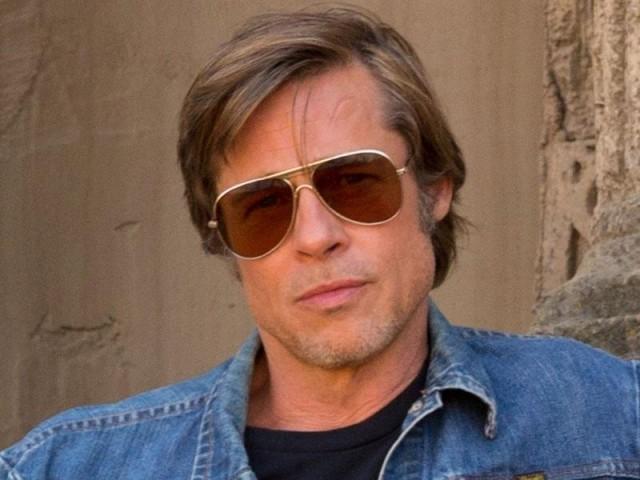
I would describe Cliff as fearless with a sprinkle of cockiness. How fearless are you and what is your sprinkle?
I mean fearless the idea of that is going to climb Everest or bungee jumping or something — I'm not so much interested in that anymore. I see fearlessness as sometimes speaking up or speaking out. I still feel like I'm groping my way through.
But Cliff, yeah, I think that's pretty good explanation of Cliff. There's still a little bit of devilish in him. He's like, look for the best in people but expect the worst. And he's fine and if people want to dig their own grave... We used to have a saying back at home it was, give them enough rope and they'll hang themselves. Yeah, I think he's okay with that.
Leonardo DiCaprio
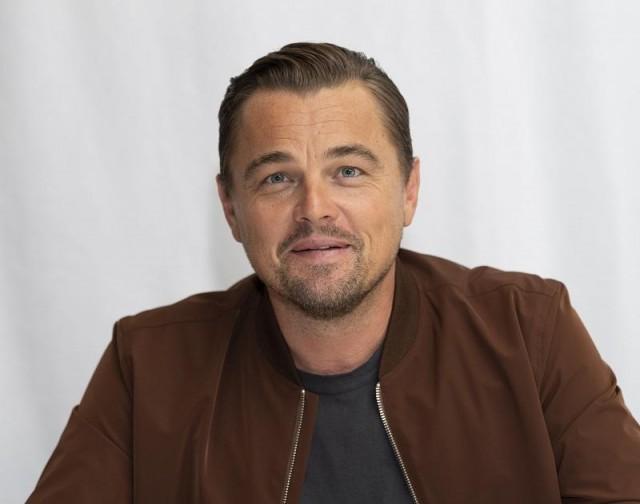
In which way did you relate to your character?
Immediately, although my career trajectory had taken a different course, I think that I immediately connected with Rick. It’s intrinsically somebody that I knew growing up in the industry, and in a lot of ways, he’s a man dealing with his own mortality. We are in an industry where you become immortalized by film and television but he’s realizing that the culture and the industry has passed him by.
It was interesting for me to go on that learning process with Quentin because he’s not only a great historian but also a cinephile and he also has this amazing appreciation for B-films and television that I have never seen and I’ve never been exposed to.
There are a lot of different actors, from Ty Harden to Ed Burns to William Shatner to this guy named Ralph Meeker who I clung onto as a real inspiration, somebody who I wasn’t familiar with, but had done some amazing work and one who Quentin considers one of his favorite actors of all time.
So we got to go on this journey of discovery together to figure out who Rick Dalton is, because he is an actor who is slowly realizing that he may vanish. Within this two day construct, I wanted to convey his realization that he needs to stop feeling sorry for himself and that there is always opportunity out there and there is an ability to come back, even though time and the industry is passing him by.
_2019_07_28_13_04_10.jpg)
The Leonardo DiCaprio Foundation has been around for 20 years. Looking back, what are you most proud of the work you have done?
The supporting of a lot of indigenous communities — they are on the front lines. For example, what is going on in Brazil right now with this new administration that wants to enter the Amazon with not only hydroelectric dam and mining and cattle farming, that would mean the disintegration of the fabric and web of life, of the last lungs of earth.
We need to support those indigenous tribes who really are the last stronghold in retaining these places from disappearing forever. We give, I won’t talk about the specific number that we gave away, you can research that, but we gave over 200 different grassroots organizations that aren’t a part of a massive bureaucracy most of the time and supported the local communities that are fighting for not only their existence but the habitat and the bio-diversity that lives there.
Margot Robbie
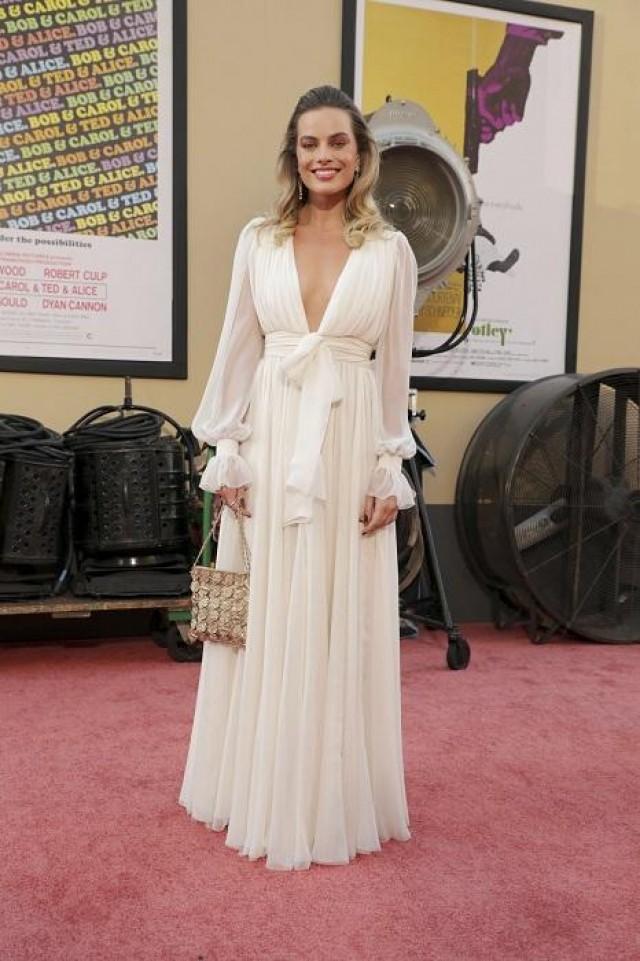
You wrote a fan letter to Quentin once. At what point did you write it and how did your experience of working with him live up to you as a fan?
I did write him a letter just to let him know that I’ve loved his films as long as I can remember and that I would so love to see him work at some point. I offered to work in craft service or something just to get onto one of his sets.
I was shocked that…I didn’t even know if the letter would get to him and the letter did get to him and then he asked for a meeting and that’s when he told me about the project, which I think was in super, super early stages.
It was another little while until I could read the script. But fast forwarding to the actual experience of working with him, as a massive Tarantino fan my expectations could not have been higher and he exceeded them.
In the same way that Sharon Tate saw her name on a marquee, when was the first time you saw yourself on a poster and what was it like to you?
I was in Time Square and there was a massive poster for “Pan Am” and I’d just gotten to America a few months ago, really, and I was standing in Time Square. I don’t know how long I stood there I just couldn’t believe that it was happening.
And I remember asking someone on the street to take a picture of me in front of the poster. And they kept cropping the poster out and I kept saying…oh no, could you take it again, can you get the poster…and they could not for the life of them understand why on earth I wanted this giant poster in the picture as well. But I still have the picture.
In researching Sharon Tate, what surprised you about her and did you ever talk to her sister Debra?
I did. I spent time with Debra, who is just the most amazing woman and so amazing for being as gracious with her time with me as she did. She was amazing, she is amazing and I’m very, very grateful for that time I got to spend with her.
What surprised me? I guess not so much surprised but I was interested to discover the more human parts of her, I suppose. Because of course at first glance you very quickly get the impression that she was beautiful and lovely and kind and all those wonderful things and she was emerging onto the scene and finding her feet in her career and her career was really picking up.
So those things I already knew. And then I was delighted to hear the more personal stories like when she would be funny or cheeky, discovering her sense of humor was something that delighted me.
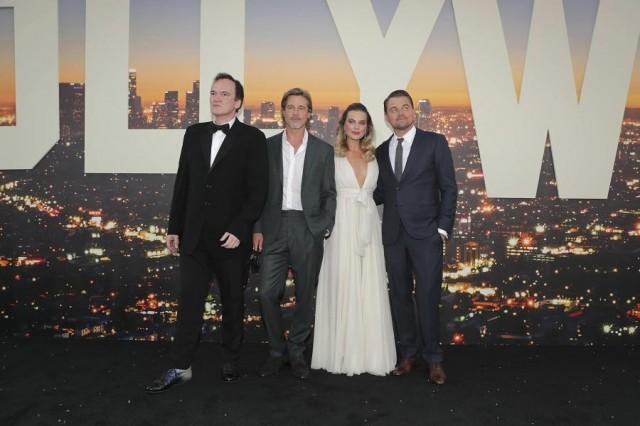
Do you remember your first Hollywood party where all of a sudden there was this plethora of personalities?
Yeah, as far as my experience of a giant party like that, I don’t know what the first one would have been but I remember definitely, probably after Oscar’s party or something was probably the first time I saw more famous people in one place than I ever had before.
Have you ever been to the Playboy mansion parties yourself?
I have not been to a real Playboy Mansion party, only the one we shot up there. But honestly that night of shooting that scene felt like a real party, it was insane, it was amazing, it was the most fun ever. Honestly, Quentin and I both said we got home that night and you couldn’t sleep because you were just buzzing so much, it was amazing. Amazing to see what it could have been like back in those days.
Quentin Tarantino
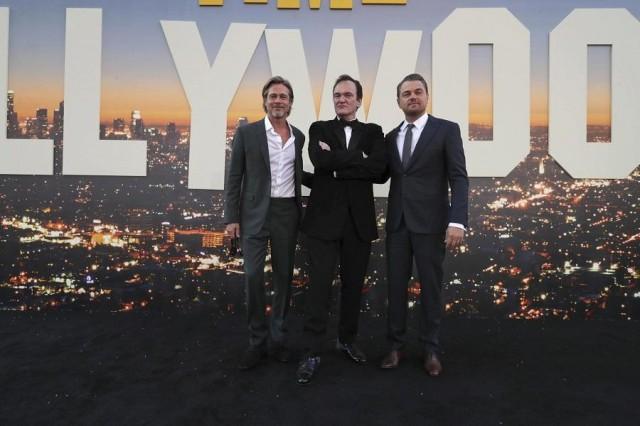
One of the things I liked about the movie is your homage to Los Angeles. Can you talk about that love of yours for that lost Hollywood and what inspired you?
One of the things that I really brought to the movie is I lived in Los Angeles county in 1969. I don’t know if it would have the same resonance if I hadn’t personally listened to KHJ radio back then as every kid in school and everybody in my family did, and everybody I knew did frankly to tell you the truth.
If I hadn’t spent so much time sitting in a Karmann Ghia, looking at, driving around Los Angeles, seeing the city pass by, looking at the billboards and the bus stops and all the ads and remembering what was on TV at that time and remembering the songs that were on the radio, just remembering the town. This fits into that fable thing I was talking about.
I have made a few references that to some way or another, this is my “Roma” and what I mean by that, is that it’s a memory piece made up from my memory. Now part of the thing in a memory piece is that it’s not entirely factual, three years can be reduced to one year when you are thinking about a childhood memory. And maybe you don’t have it quite right in your head but you don’t know that. And that’s where I wanted to live as far as my memory, as far as putting it together.
It’s easy to follow certain facts that I can look up and have that happen and of course I didn’t do that, but that there was painting pictures from my head that are my memory. So less important than looking at a photo of what Riverside Drive looked like at that time, it was more my memory of what I thought it looked like.
Your career has spanned about 27 years or longer. You have achieved so much. What are you the proudest of?
I have so many things to be proud of. I guess the real answer to that question would be the body of work, the films themselves. But to go a little bit more in the spirit that you mean the question, my proudest moment as far as a signifier along the way that happened that meaning, it would be winning the Palme D’or for “Pulp Fiction.” At the end of the day it’s just a trophy, but it’s a pretty great trophy.
More than the Oscar?
They’re all trophies. My joke about the Palme D’or is the only thing more prestigious than the list of directors who have won the Palme D’or is the list of directors who haven’t. — LA, GMA News




